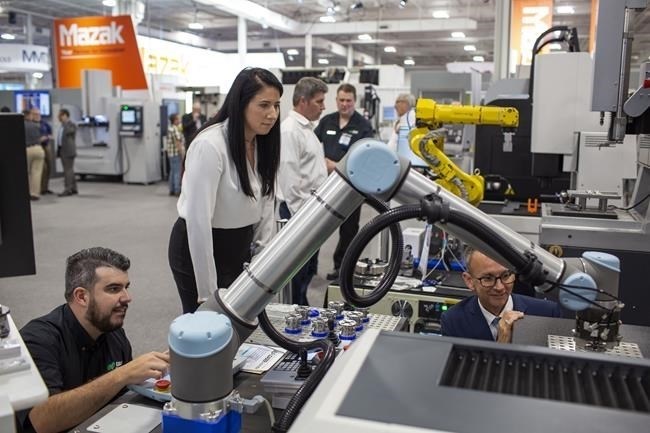
People attend the 2019 Canadian Manufacturing Technology Show in a handout photo. Artificial intelligence and increased automation can help lessen the load for workers at a time when Canada faces a labour shortage in the construction and manufacturing sector.
Image Credit: THE CANADIAN PRESS/HO-Canadian Manufacturing Technology Show-Marcus Oleniuk **MANDATORY CREDIT**
September 23, 2023 - 12:30 PM
TORONTO - Artificial intelligence and increased automation can help lessen the load for workers at a time when Canada faces a labour shortage in the construction and manufacturing sector.
That's one of the messages being shared at this year's Canadian Manufacturing Technology Show taking place in Toronto next Monday to Thursday. The annual event is put on by SME, formerly the Society of Manufacturing Engineers, which represents various players in North America's manufacturing industry.
Combatting misconceptions about AI is one of the challenges facing the industry, especially as new technology becomes increasingly necessary, said Julie Pike, senior director of event strategy for SME.
"The human level to resist change is always there," she said, noting that some in the industry often fear new technology is being ushered in to replace jobs rather than alleviate their workloads.
"As organizations set up technologies that allow systems that are normally produced by humans to be more streamlined, we can free up human capital," said Pike.
"We can free up our time and resources to grow those areas further so you do have a job."
Last year, Canadian Manufacturers and Exporters' annual labour survey showed that labour and skills shortages resulted in nearly $13 billion of economic losses. Sixty-two per cent of the 563 manufacturers surveyed said they have lost or turned down contracts due to a lack of workers, resulting in $7.2 billion in lost sales.
A separate report released in June by KPMG Canada found nine in 10 Canadian construction companies are dealing with a shortage of skilled labour or trades amid unprecedented demand.
The survey of 275 construction companies found digital technology was widely viewed as a solution to addressing those shortages. But respondents said Canada's construction industry has been slow to adopt new digital technologies, with nearly three-quarters feeling the sector lags behind other countries in that regard.
"A large portion of our organizations are small-to-medium-sized companies and they're really in varying stages on this pursuit of adapting and adopting (AI) into their processes and operations that will ultimately help them from an efficiency side, cost savings, improvements and the like," said Pike.
She pointed to the story of Massimiliano Moruzzi, one of this year's keynote speakers at the conference and CEO of intelligent automation startup Xaba.
The Toronto-based company, launched last year, uses an AI platform to enable the creation of a fully functional robotic car chassis that understands the properties of carbon fibre and is capable of calculating and controlling the material’s variables on its own.
Using industrial AI software, he said robots designed by Xaba can take on tasks such as welding, drilling, assembling and additive manufacturing — eliminating the need for extra programming expenses and time-consuming trial-and-error efforts.
"A big missing point in the automation industry, in the AI bridging to the automation … was the lack of a synthetic brain," he said.
"We've developed a synthetic brain for the automation industry — for robotics and machines as well. We built the robot at Xaba and then we built the brain of the robot. We saw the machine responding completely differently to us. In essence, we saw the machine unlocking capacity."
Moruzzi said the technology is different from existing AI solutions as it allows real people to work with a machine "that can talk to you and use its own knowledge to help solve the business challenges you face" — as opposed to performing tasks in place of a human.
"Current mechanization is … removing the job. You have robots that are spreading the jam on your bread, like a human does today," he said.
"That's the problem that we have. They are not creating jobs, they are not creating anything new. They're creating something that we have already known for ages. We have to go away from that."
Pike said industry leaders are focusing on educating their peers on how AI can help them at a time when there are simply not enough workers available to handle every task that companies need to get done.
"The truth is it's hard to build and fly the plane or drive the car at the same time," she said.
"So how do we help manufacturers and industry at large adapt and continue to be productive at the same time?"
This report by The Canadian Press was first published Sept. 22, 2023.
News from © The Canadian Press, 2023